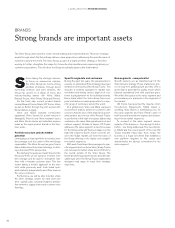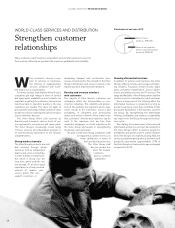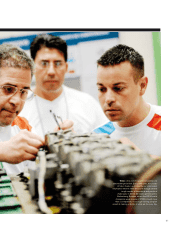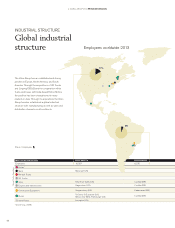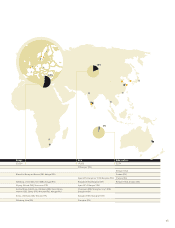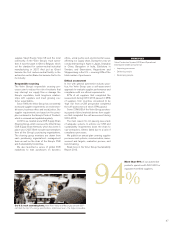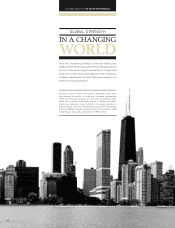Volvo 2013 Annual Report Download - page 44
Download and view the complete annual report
Please find page 44 of the 2013 Volvo annual report below. You can navigate through the pages in the report by either clicking on the pages listed below, or by using the keyword search tool below to find specific information within the annual report.
A GLOBAL GROUP 2013 BUSINESS MODEL
product development and to secure the access
to competent employees.
One example is the Academic Partner Pro-
gram (APP), which is a systematic approach for
long-term cooperation with selected universi-
ties and research institutes in areas of special
interest. The program aims to provide the Group
with a picture of important collaborative part-
ners and to increase the Group’s visibility to stu-
dents and researchers. The cooperation with
universities is also important for building capa-
bility and creating relationships with students
and potential employees to secure access to
future competence.
There are two modules in place – Preferred
Research Partners for collaborative research
projects and Preferred Talent Partners for
recruitment purposes. In total, the Volvo Group
has 11 Preferred Talent Partners (T) and Pre-
ferred Research Partners (R) in APP globally:
National Institute of Technology, Karnataka (T)
in India, EM Lyon (T) and INSA Lyon (R, T) in
France, Tsinghua University, Beijing (T) and
Tongji University, Shanghai (T) in China, Chalm-
ers University of Technology, Gothenburg (R, T),
University of Skövde (R), School of Business,
Economics and Law, Gothenburg (T) and
Mälardalen University, Västerås/Eskilstuna (R)
in Sweden and North Carolina State University
(T) and Pennsylvania State University (R, T) in
the U.S.
Competence development
Investing in the Group’s employees is a funda-
mental part of staying competitive, sustainable
and profi table. The Volvo Group’s training pro-
grams are offered at all levels for employees,
and the activities range from traditional and
e-based training to individual coaching and
mentoring.
Individual competence development is based
on a personal business plan, which provides
support for translating corporate strategic
objectives into individual objectives and contri-
bution. The purpose is to ensure that employ-
ees clearly understand their role in the team
and what is expected of them.
Increased global presence, new products,
new technologies, demographic changes
and more rapid fl uctuations in the global
economy will lead to challenges in the
supply of expertise and resources.
Attracting and retaining competence
The Volvo Group’s ambition is to offer interest-
ing opportunities and a unique company culture
that help us attract and retain the best people,
whoever they are and wherever we do business.
Without engaged employees, who are willing
to take an active part in the Group’s develop-
ment and future, the Volvo Group will not suc-
ceed in pursuing its strategies. It is therefore
important that we attract the right expertise to
continue the development of environmentally
enhanced products. The Volvo Group regularly
maps the strategic competence needs, and
annually aggregate fi ndings on a Group level to
identify the most important future needs.
The Volvo Group’s Code of Conduct pre-
scribes the minimum standard our employees
can expect from their employer, but also their
own responsibilities.
A qualifi ed talent pool
Multiple factors infl uence the availability of tal-
ent for our industries. These included diminish-
ing interest in science, technology, engineering
and mathematics in some developed markets,
limitations in the educational system in some
emerging markets and the long-term decline in
the number of people in working age in devel-
oped markets.
In order to develop and attract a qualifi ed tal-
ent pool for our industries, the Volvo Group is
engaged in several initiatives, such as the Volvo
Step, a one year vocational program training
program for unemployed youth in Sweden, and
vocational training schools in for instance South
America and Africa.
Academic Partner Program
The Volvo Group is also involved in a compre-
hensive series of cooperative ventures with
research bodies and academic institutions to
advance the technologies needed for future
The Volvo Group’s vision is to become the world leader in sustainable
transport solutions. A deciding factor in fulfi lling this vision is our
employees and their knowledge and skills.
A HIGH-PERFORMING ORGANIZATION
Committed employees
40


